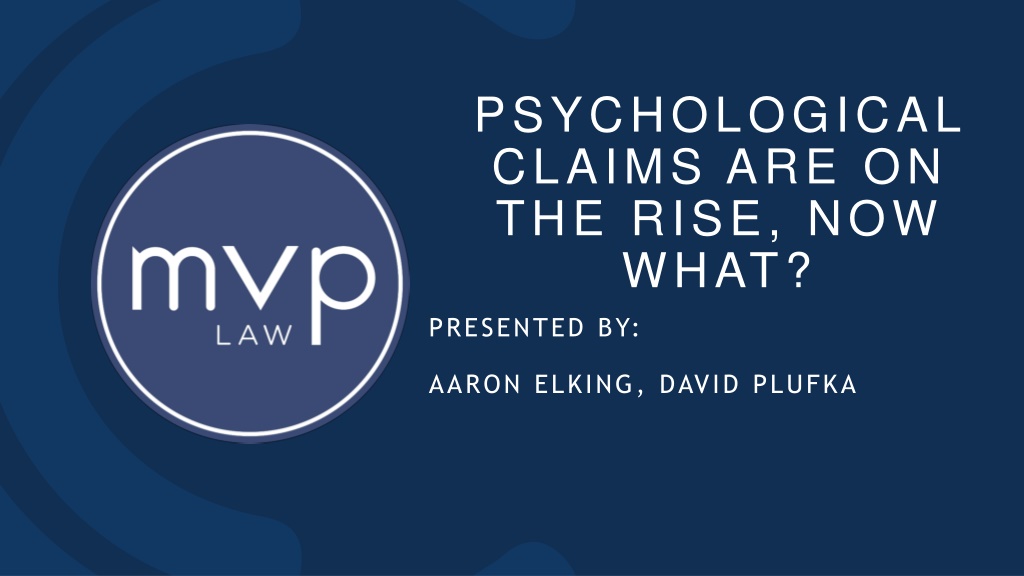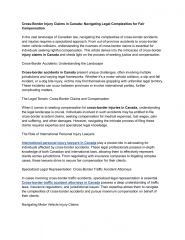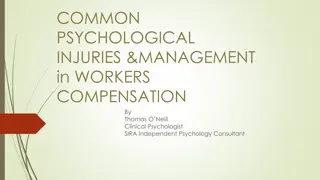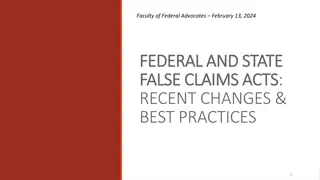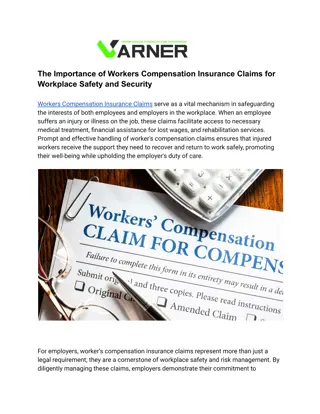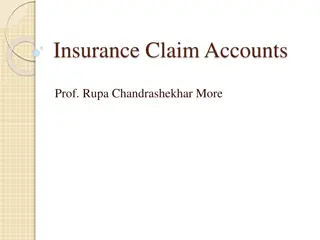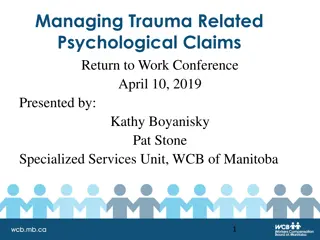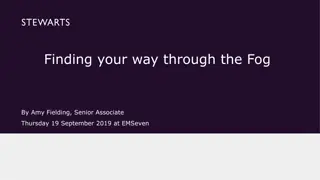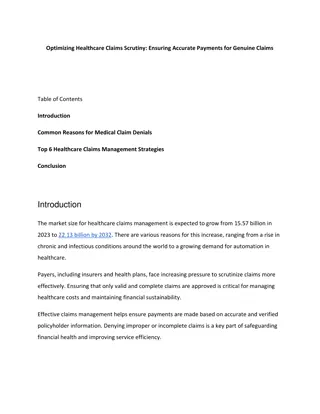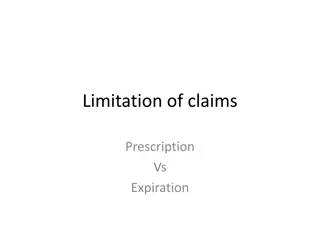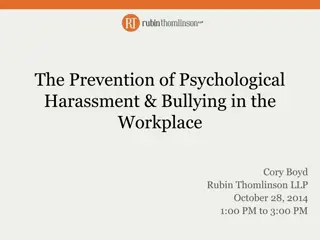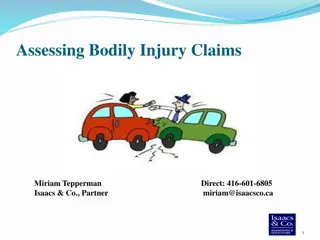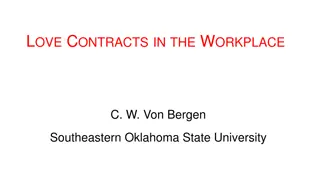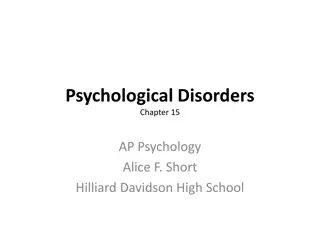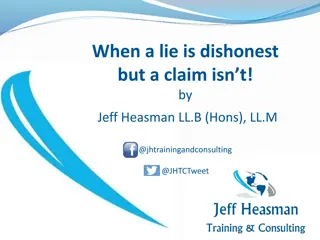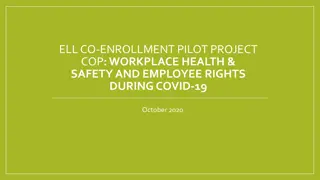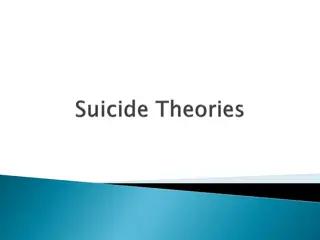Understanding Psychological Claims in the Workplace
Exploring the rise of psychological claims in work comp, this information covers types of mental stress claims, psychological claim regulations by state, standards of causation for physical injury-mental stress and mental stress-mental stress, as well as examples of how work-related stress can impact employees. Specific details on Missouri’s approach to psychological claims are also highlighted.
Download Presentation

Please find below an Image/Link to download the presentation.
The content on the website is provided AS IS for your information and personal use only. It may not be sold, licensed, or shared on other websites without obtaining consent from the author. Download presentation by click this link. If you encounter any issues during the download, it is possible that the publisher has removed the file from their server.
E N D
Presentation Transcript
PSYCHOLOGICAL CLAIMS ARE ON THE RISE, NOW WHAT? PRESENTED BY: AARON ELKING, DAVID PLUFKA
TYPES OF MENTAL STRESS CLAIMS IN WC Physical injury Mental Stress Mental Stress Physical Injury Mental Mental
PSYCHOLOGICAL CLAIMS BY STATE Missouri No physical injury required for mental stress claim. Illinois must be able to be tied to a time, place, and cause. No physical injury needed.
PHYSICAL INJURY-MENTAL STRESS Standard of Causation: Was the work accident the prevailing factor in the development of the medical condition and disability? Example: Claimant, an OTR truck driver, is in a MVA and rolls his rig over a guard rail and down an embankment. He suffers multiple fractures and is now afraid to return to truck driving for fear of another accident.
MENTAL STRESS- MENTAL STRESS Standard of Causation for Occupational Disease: Is the mental stress caused by extraordinary or unusual stress? Mental stress claim can not be based on termination, demotion or lack of promotion. The stress exposure has to be extraordinary/unusual compared to the occupation. Example: Claimant alleges anxiety and depression from co-workers and supervisors yelling at him over a 5-year period at work on a constant basis.
MENTAL STRESS- PHYSICAL INJURY Less common in work comp Sometimes overlaps with civil actions for harassment, retaliatory discharge, discrimination, etc. Standard of Causation: Was the mental stress the PF in the development of the medical condition and disability. Example: Claimant works long hours with many deadlines to meet in high pressure job as a surgeon, criminal lawyer, air traffic controller, WC claims rep, etc. and suffers a rash, heart attack, etc.
MISSOURI: PSYCHOLOGICAL CLAIMS
MO. REV. STAT. 287.120- PSYCHOLOGICAL CLAIMS: Mental injury resulting from work-related stress does not arise out of and in the course of employment unless it is demonstrated that the stress was work related and extraordinary and unusual Work stress measured by objective standards & actual events Mental injury did not arise out of course of employment if it resulted from disciplinary action, work evaluation, job transfer, layoff, demotion, termination, or any similar events by employer taken in good faith
BRASWELL V . MISSOURI STATE HIGHWAY PATROL Claimant was Missouri State Highway Patrol trooper, witnessed other officers use taser on restrained individual Claimant mistook taser for service revolver. Claimant began experiencing emotional issues and received treatment for it Commission decided statute did not apply here because the case resulted from a traumatic event rather than work- related stress Event was in fact compensable under statute
JONES V . WASHINGTON UNIVERSITY ALJ found under 287.120.8,Jones mental injuries were not compensable because she could not prove that her stress was extraordinary and unusual ALJ improperly applied 287.120.8, because Jones claim did not arise from work-related stress, but from a physical assault which took place at work. Event included physical contact/impact of patient grabbing claimant s breast rather than from work- related stress. Physical injury mental stress, not Mental stress causing mental injury
GEORGE V . CITY OF SAINT LOUIS Missouri Court ofAppeals affirmed; Found Firefighter s PTSD is an occupational disease as a natural consequence of his employment Did not need to show job stresses were extraordinary and unusual compared to other firefighters of equal rank Section 287.067.5 enumerates certain diseases which are normally noncompensable but are compensable for firefighters if they are shown to have been directly caused by a firefighter's exposure to smoke, gases, carcinogens, inadequate oxygen, or psychological stress Claimant's performance of his usual and customary duties as a firefighter was a substantial factor in causing his PTSD and exacerbating his depression.
MANTIA V. MO DEPT OF TRANSPORTATION Highway Patrol worker, 20+ years; Employee and her crew responded to the more serious accidents, which often included fatalities. To recover under section 287.120.8, a claimant must demonstrate "by objective standards and actual events" the amount of work stress endured was both "work related and was extraordinary and unusual." The claimant must also demonstrate that based on this work-related stress, he or she suffered a mental injury. There was no evidence presented in this case that Employee's work-related stress was objectively "extraordinary and unusual" as statutorily required. Employee undoubtedly found her employment to be extremely stressful.
CITY OF CLINTON V. ROBERT DAHMAN Court of Appeals Western District-filed May 30, 2023. Claimant was a police officer that responded to an active crime scene after another officer was fatally shot. Claimant diagnosed with PTSD. Resigned from the police department a short time after the incident. Claimant responded to domestic violence calls, made traffic stops, and secured hundreds of crime scenes prior to incident. The police officer that was shot and killed was a friend of the claimant on the force. Claimant heard other officer report traffic stop and state, Shots fired. Officer hit. At that point, claimant responded to scene and found the officer unconscious on the ground. Claimant feared for his safety at the accident scene because he was wearing protective gear just as the officer shot. Claimant thought the shooter could still be in the area and it was dark that night.
CITY OF CLINTON V. ROBERT DAHMAN This was first line-of-duty fatality in Clinton. Chief of Police testified that the shooting was an unusual and extraordinary event for the City of Clinton Police Department. Other officers were experiencing similar mental health issues after the shooting. City brought in counselors and crisis team to speak to police officers. Both mental health experts agreed on PTSD diagnosis. Both mental health professionals agreed the stress experienced was extraordinary and unusual. Employer expert concluded claimant did not have PPD associated with PTSD.
CITY OF CLINTON V. DAHMAN ALJ, LIRC, and Court of Appeals held that Claimant showed by objective standards that stress was both extraordinary and unusual. How do you compare stress of claimant to others? Compare claimant s level of stress with others in similar positions. Claimant must demonstrate the events he experienced were what a reasonable (police officer) would experience as extraordinary and unusual stress.
DEFENDING PYSCHOLOGICAL CLAIMS
STEPS IN DEFENSE Define the question Records, records and more records! Engage the expert Choosing your expert
THE PSYCHIATRIC IME-HISTORY Personal History Education Work History Past Medical/Surgical History/Medication/Allergies/ROS Past Psychiatric/Substance Use History Legal History Family History
EXPERTS Psychiatrist medical doctor specializing in psychiatry Psychologist - focus psychotherapy, treat emotional and mental suffering in patients with behavioral intervention Neurologist - specialist in the anatomy, functions, and organic disorders of nerves and the nervous system Neuropsychologist - study of the relationship between behavior, emotion, and cognition alongside brain function Nurses Social Workers/LCSW talk therapy and counseling Nurse Practitioners may prescribe medications
CHALLENGES FOR FORENSIC PSYCHIATRY IME Diagnostic challenges with manual-based syndromes Lack of full longitudinal history No laboratory or imaging findings Everyone thinks they are a psychiatrist
THE PSYCHIATRIC IME Forensic Examination Medical and psychiatric knowledge required to help answer a legal question Clinician Evaluation First, Do No Harm Beneficence Confidential Collateral sources of information are required May seek collateral sources of information to provide good care, but care not withheld if the sources are not available Non-confidential Opinion may be harmful or at least not helpful
